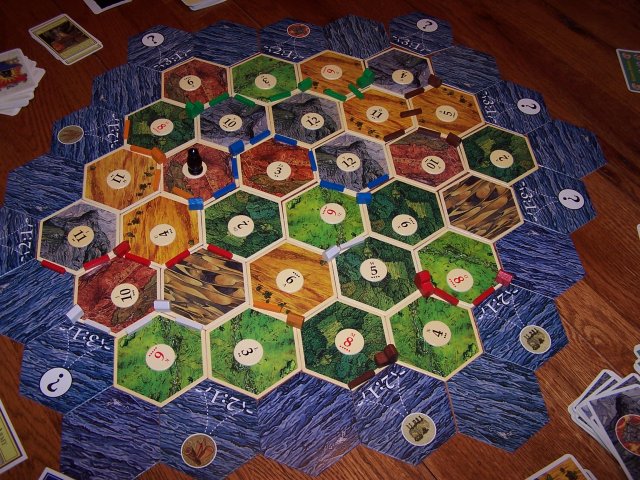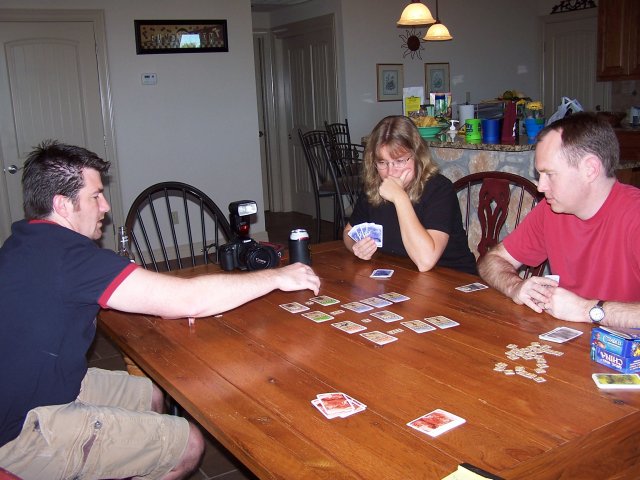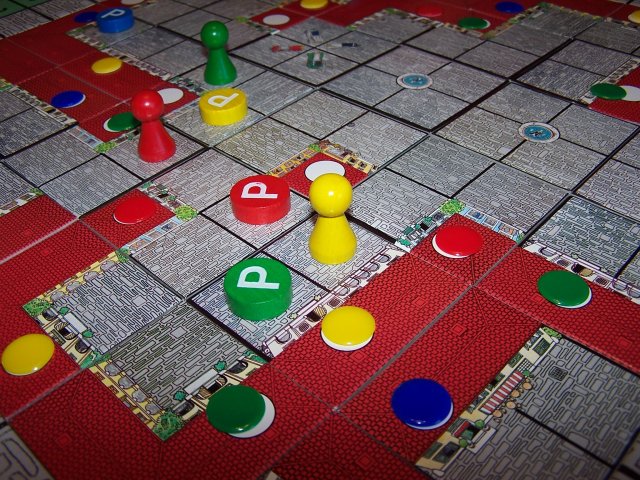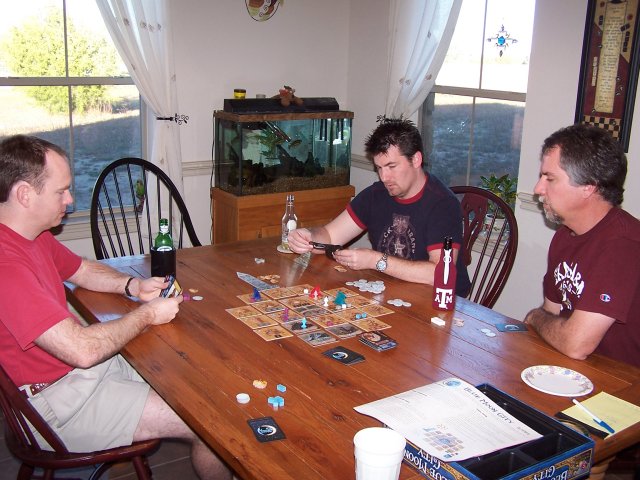
December 5, 2006Game Day Report for November 24, 2006by Susan RozmiarekRats. It's been well over a month since my last post. I look like one of those people who start a blog and abandon it when they get bored. I can assure you that this is not the case with me. I actually have a pretty good excuse this time. A sad but expected death in my extended family has taken me out-of-town several times in the past month. My time at home has been spent playing catch-up. Gaming and blogging have been unlucky casualties of a hectic schedule. I've squeezed a few games in here and there, but I haven't had time to post any thoughts. Things have settled down now, and with our weekends back due to the end of the kids' soccer season, Ed and I plan to cram as much gaming into December as we possibly can. Just about anyone who lives in the USA is familiar with Black Friday, the day after Thanksgiving when throngs of crazed American shoppers line up to get the best deals in the cold, dark, wee hours of the morning outside of stores and malls that open as early as 5am. Heck, we had stores here opening as early as midnight. Insane! We chose not to partake in this consumer-driven madness and spent the day playing games instead as part of National Games Week. With the holidays, turnout was light but we had seven gamers which was enough for two tables.
Great Wall of ChinaHere is yet another new game that reminds me of older games but is put together and packaged differently enough to please me. I've been saying that a lot lately and will no doubt continue repeating myself like a broken record because this seems to be either a designing trend and/or an indication that I've played too many different games over the years. Like Knizia's earlier game Taj Mahal, Great Wall of China has players battling over something (points tokens in this case) with cards of various values and special powers. Whether you win a token or not, you eventually lose all the cards you played in trying. This is a rather painful aspect that I do not enjoy in Taj Mahal, but in this game players fight several different battles at the same time, making it more likely that you'll win something. Also, players each have the exact same set of cards to play during the game. They draw from their personal deck randomly, but at least they aren't at the mercy of random draws from a common deck. The identical sets of cards, the special card actions, and the effects of obtaining tokens create intriguing nuances to the game. Ed and I both liked the game enough to purchase it. PalermoEd has been trying to dust off this oldie and get it to the table but he has been met with resistance, no doubt because it is neither meaty nor new. Since most of the resistance was still engaged in Reef Encounter, this time he was successful. Palermo is an older style game that is not going to "wow" today's experienced eurogamer but it represents a sort of "comfort food" of games for me. These are the sort of games that I played and enjoyed the most when I first discovered German games around 1999. These older comfort games usually involve some sort of tile-laying and a clever way of moving pieces. The decisions during the game are often fairly easy and tactical, but back when my gaming experience consisted of games like Monopoly and Life, these simple decisions seemed quite clever. Besides Palermo, other games filed away in my mind under this category are Café International, Viva Pamplona!, Volle Hütte!, and Marracash. Two recent games that fall into this category are California and The Downfall of Pompeii. (The latter I've been playing and enjoying quite a bit. I plan to write a review soon.) Anyway, despite the fact that most of these games feel a bit dated and only get around a 6/10 rating on BGG, I find that I still enjoy them as long fillers or family games. They may even qualify as Super Fillers, as defined by Mike Siggins.
Blue Moon CityI've already written some thoughts on this game in a previous post. I'm starting to suspect that it isn't going to have a whole lot of longevity but I'll enjoy it while it lasts. This was another close race with us all within striking distance of the win. HimalayaAfter playing three light games, I was ready for something a bit more think-y. Himalaya is a pick-up and deliver game in which players move their yaks around the board, picking up goods at different locations and fulfilling various orders at other locations. The goal of the game is to have the majority in the three different types of influence - religious, political and economic - although the victory condition differs for different numbers of players. At the start of each round, players program their moves and actions for the round, RoboRally-style, which are then revealed and executed one-by-one in turn order. Goods at a location are taken in order from least valuable to most and player turn order is strictly observed when picking up goods or fulfilling an order at a location. Therefore, it is possible to get hosed. When you fulfill an order, you get to do two out of three possible actions (one affecting each type of influence) at that location. The particular order, type of village, and location on the board will affect which of the actions is most valuable to you.
Settlers of Catan with Event CardsI prefer playing Settlers with fewer than six players, but I was willing to suffer this time as it gave me a chance to try the new Catan Event Cards. This is essentially a "deck of dice" with some of the cards also having an event that takes place when the card is drawn. Mark has always pushed for trying the game with a dice deck to ensure that the numbers come up in a statistically correct fashion. While this would in theory squelch the inevitable whining over bad dice rolls, this particular deck did not due to the New Year card. The deck is shuffled and then this card is placed on top of the bottom five cards. The deck is reshuffled when the New Year is drawn. During the first time through the deck, guess where most of the eights were located? Yep, at the bottom under the New Year card! So there was plenty of whining anyways. I'll take my dice back, thank you very much. I like the fact that with a dice rolls, anything can happen in the game, including strings of twos and twelves which almost always help me with my inevitable poor choice of settlement locations. But, we do need to be generous to the less fortunate. Since we were playing with a new element, the Event Cards, we chose not to play with the food stamp variant. What a dumb, dumb decision. Every time I play Settlers without this variant I regret it. Bring back the welfare! Jon steamrolled over us with Mark finally getting close enough to be a threat before Jon won. Without charity, I was stuck, often going three turns without new resources. Also, I had hoped that the events would spice up the game but they were not very frequent. I was glad to get to try this deck but I'll take my chances with the dice in the future. We finished off the night with a six-player game of basic Settlers of Catan with the new Event Cards. For more pictures from this gaming session and others, see our Gaming Picture Gallery. Comments
I'm glad to have you back but sad to hear the reason for your absence. I've never heard of Palermo but it sounds like the kind of game my family would enjoy. Thank you for the quick overview of it. Now I'm off to the Geek. :) Posted by: Mary (Sodaklady) on December 5, 2006 7:12 PMPost a comment
This page viewed E-mail Ed Rozmiarek with questions or problems concerning this page. Copyright © 2006, Ed & Susan Rozmiarek. |


